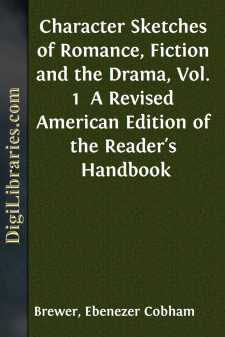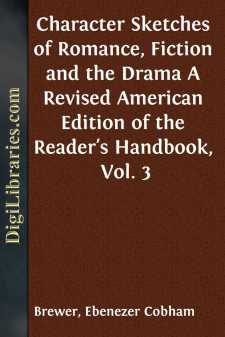Categories
- Antiques & Collectibles 13
- Architecture 36
- Art 48
- Bibles 22
- Biography & Autobiography 813
- Body, Mind & Spirit 142
- Business & Economics 28
- Children's Books 14
- Children's Fiction 11
- Computers 4
- Cooking 94
- Crafts & Hobbies 4
- Drama 346
- Education 46
- Family & Relationships 57
- Fiction 11829
- Games 19
- Gardening 17
- Health & Fitness 34
- History 1377
- House & Home 1
- Humor 147
- Juvenile Fiction 1873
- Juvenile Nonfiction 202
- Language Arts & Disciplines 88
- Law 16
- Literary Collections 686
- Literary Criticism 179
- Mathematics 13
- Medical 41
- Music 40
- Nature 179
- Non-Classifiable 1768
- Performing Arts 7
- Periodicals 1453
- Philosophy 64
- Photography 2
- Poetry 896
- Political Science 203
- Psychology 42
- Reference 154
- Religion 513
- Science 126
- Self-Help 84
- Social Science 81
- Sports & Recreation 34
- Study Aids 3
- Technology & Engineering 59
- Transportation 23
- Travel 463
- True Crime 29
Character Sketches of Romance, Fiction and the Drama, Vol. 1 A Revised American Edition of the Reader's Handbook
Description:
Excerpt
A'RON, a Moor, beloved by Tam'ora, queen of the Goths, in the tragedy of Titus Andron'icus, published among the plays of Shakespeare (1593).
(The classic name is Andronicus, but the character of this play is purely fictitious.)
Aaron (St.), a British martyr of the City of Legions (Newport, in South Wales). He was torn limb from limb by order of Maximian'us Hercu'lius, general in Britain, of the army of Diocle'tian. Two churches were founded in the City of Legions, one in honor of St. Aaron and one in honor of his fellow-martyr, St. Julius. Newport was called Caerleon by the British.
... two others ... sealed their doctrine with
their blood;
St. Julius, and with him St. Aaron, have their
room
At Carleon, suffering death by Diocletian's doom.
Drayton, Polyolbion, xxiv, (1622).
Aaz'iz (3 syl.), so the queen of Sheba or Saba is sometimes called; but in the Koran she is called Balkis (ch. xxvii.).
Abad'don, an angel of the bottomless pit (Rev. ix. 11). The word is derived from the Hebrew, abad, "lost," and means the lost one. There are two other angels introduced by Klopstock in The Messiah with similar names, but must not be confounded with the angel referred to in Rev.; one is Obaddon, the angel of death, and the other Abbad'ona, the repentant devil.
Ab'aris, to whom Apollo gave a golden arrow, on which to ride through the air.—See Dictionary of Phrase and Fable.
Abbad'ona, once the friend of Ab'diel, was drawn into the rebellion of Satan half unwillingly. In hell he constantly bewailed his fall, and reproved Satan for his pride and blasphemy. He openly declared to the internals that he would take no part or lot in Satan's scheme for the death of the Messiah, and during the crucifixion lingered about the cross with repentance, hope, and fear. His ultimate fate we are not told, but when Satan and Adramelech are driven back to hell, Obaddon, the angel of death, says—
"For thee, Abbadona, I have no orders. How long thou art permitted to remain on earth I know not, nor whether thou wilt be allowed to see the resurrection of the Lord of glory ... but be not deceived, thou canst not view Him with the joy of the redeemed." "Yet let me see Him, let me see him!"—Klopstock, The Messiah, xiii.
Abberville (Lord), a young nobleman, 23 years of age, who has for travelling tutor a Welshman of 65, called Dr. Druid, an antiquary, wholly ignorant of his real duties as a guide of youth. The young man runs wantonly wild, squanders his money, and gives loose to his passions almost to the verge of ruin, but he is arrested and reclaimed by his honest Scotch bailiff or financier, and the vigilance of his father's executor, Mr. Mortimer. This "fashionable lover" promises marriage to a vulgar, malicious city minx named Lucinda Bridgemore, but is saved from this pitfall also.—Cumberland, The Fashionable Lover (1780).
Abbot (The), the complacent churchman in Aldrich's poem of The Jew's Gift, who hanged a Jew "just for no crime," and pondered and smiled and gave consent to the heretic's burial—
"Since he gave his beard to the birds." (1881.)
Abdal-azis, the Moorish governor of Spain after the overthrow of king Roderick....



